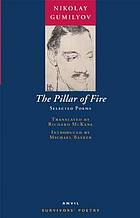Wikipedia:
Nikolay Stepanovich Gumilyov (Russian: Никола́й Степа́нович Гумилёв; IPA: [nʲɪkɐˈlaj sʲtʲɪˈpanəvʲɪtɕ ɡʊmʲɪˈlʲɵf] ( listen); April 15 NS 1886 – August 25, 1921) was an influential Russian poet, literary critic, traveler, and military officer. He was the cofounder of the Acmeist movement. Nikolay Gumilev was arrested and executed by the Cheka, the secret Soviet police force in 1921.
When World War I started, Gumilyov hastened to Russia and enthusiastically joined a corps of elite cavalry. He fought in battles in East Prussia and Macedonia.[4] For his bravery he was invested with two St. George crosses (December 24, 1914 and January 5, 1915).
His war poems were assembled in the collection The Quiver (1916). In 1916 he wrote a verse play, Gondla, which was published the following year; set in ninth-century Iceland, torn between its native paganism and Irish Christianity, it is also clearly autobiographical, Gumilev putting much of himself into the hero Gondla (an Irishman chosen as king but rejected by the jarls, he kills himself to ensure the triumph of Christianity) and basing Gondla's wild bride Lera on Gumilev's wife Akhmatova. The play was performed in Rostov na Donu in 1920 and, even after the author's execution by the Cheka, in Petrograd in January 1922: "The play, despite its crowd scenes being enacted on a tiny stage, was a major success. Yet when the Petrograd audience called for the author, who was now officially an executed counter-revolutionary traitor, the play was removed from the repertoire and the theatre disbanded."[5] (In February 1934, as they walked along a Moscow street, Osip Mandelstam quoted Gondla's words "I am ready to die" to Akhmatova, and she repeated them in her "Poem without a Hero."[6])
During the Russian Revolution, Gumilyov served in the Russian Expedition Corps in Paris. Despite advice to the contrary, he rapidly returned to Petrograd. There he published several new collections, Tabernacle and Bonfire, and finally divorced Akhmatova (August 5, 1918), whom he had left for another woman several years prior. The following year he married Anna Nikolaevna Engelhardt, a noblewoman and daughter of a well-known historian.
